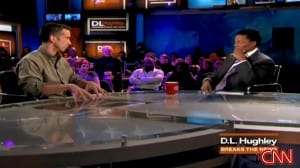by Kheven LaGrone

In contrast, African American activists have struggled to obtain the full entitlement that the white gay activist has taken for granted since birth. America has a race caste system. Fighting to reinstate the white skin entitlement is not the same as breaking down that system.
Yet many advocates of gay marriage connected the gay marriage movement to the civil rights movement. For example, they argued that years ago interracial marriage was banned. This point is irrelevant in the Prop 8 debate. Most Prop 8 proponents were fighting for family. They believe that a family is a father, a mother and their children. Since a Black man and a white woman can have children and raise their family together, their marriage would not conflict with the principles of most Prop 8 proponents.
The defeat of Prop 8 would have helped white gays and lesbians reclaim their white skin entitlement. Some are angered because they feel they came so close, but the passing of Prop 8 kept that prize out of their hands. Some were outraged because they believe that their entitlement was breached by, to use their word, “niggers.” That those protesters operated in a white supremacist paradigm was evidenced by their accosting African Americans – even those displaying “No on 8” signs – who had gone to join them in protest.
In addition, that the “No on Prop 8” movement was a fight for white skin privilege was evidenced by the fact that little outreach went out to non-white communities, otherwise grouped as “people of color.”
So now, white gay marriage activists see non-whites or “people of color.” When talk show host D.L. Hughley asked white gay sex columnist Dan Savage if the gay community was holding the minority community responsible for the gay marriage ban, the first thing Savage said is that the gay community and the minority community are not two separate things.
Hughley’s question pointed to a white gay marriage movement; Savage deflected the exposure by creating an image of a “diverse” gay community. Savage’s response diverted Hughley away from questions about white supremacy and segregation in the gay “rainbow” community.
Yet I argue that Black gay clubs, organizations, prides etc. are evidence of separate Black and white gay communities. They were created because many same-gender-loving African Americans feel alienated, marginalized and threatened in the larger “gay” rainbow community.
Savage also argued that same-gender-loving Blacks and Latinos were impacted by their communities’ vote to support the gay marriage ban. This may be true; however, after the passing of Prop 8, Black men and women who participated in anti-Prop 8 protests were verbally accosted. That reminds us why many same-gender-loving African Americans don’t feel that the white gay community is a safe space or a home. In fact, I use the phrase “same gender loving” in this essay because many African Americans don’t want to be called “gay” – “gay” connotes whiteness.
Savage, like other white gay marriage proponents, argues that the gay marriage movement needs to reach out more to non-whites if white gay activists want the support of Black voters – implying that Blacks voted for Prop 8 because they were ignorant of what they were voting for. But the Black family has been a home, a place of strength for Blacks dealing with America’s race caste system.
Contrary to popular belief, historically marriage and family have been the bedrock of Black communities. Many of the problems in Black communities are blamed on the breakdown of the Black family. Many Black voters may feel a need for the traditional family. In particular, Black religious leaders may not be so much as anti-gay, but pro traditional family.
In addition, many African Americans believe there are more important issues than same sex marriage – e.g., the two wars, the recession and the high unemployment rate that will likely impact Blacks disproportionately. As one highly educated professional Black woman – who is very supportive of gay rights – told me, to put one’s sexuality into the same arena as those topics is the height of self-indulgence.
And if the anti-No on Prop 8 movement wants to at least appear to outreach to non-whites, including African American communities, the activists will have to respect those communities. So far, the movement has not shown those communities respect. The movement overlooked them during the campaign. After the passage of Prop 8, African Americans were called “you people” and “niggers,” whether or not they voted no on Prop. 8.
The (white) gay marriage movement will have to respect cultural differences, perspectives and opinions. Even now, when talking about reaching out to the African American communities, the movement has not stated how those communities will benefit – it would be self-indulgent for activists to assume that reclaiming their white skin entitlement would benefit Black communities.
Kheven LaGrone is the editor of “Dialogue: The Color Purple,” a collection of writings by Asian and American scholars on the controversial novel. This essay was inspired and informed by the comments he received on his first essay on the passage of Proposition 8, “Pimping Blackness in the fight against Prop 8.” Kheven can be reached at kheven@aol.com.





